013: Frank Conway Reviews the Personal Habits and Advice of Our Guests of 2014
This episode reviews the personal habits and advice of the Economic Rockstar guests of 2014. I explore each episode and find, what I believe, are invaluable nuggets of information. These may not necessarily be related to economics and finance, but given that it’s a New Year, I’d like to share with you their habits and advice. I’ll be personally adopting most of these for 2015. I hope that at least one will resonate with you.
Thanks for listening and enjoy.
The Personal Habits and Advice of the Economic Rockstar Guests of 2014
1) The Importance of Being Mentored
2) Help Others
3) Talk to People
4) Network and Build Your Community
5) Create a Vision and Take Risks
6) Take Responsibilty For Your Actions
7) Give Yourself Permission to Fail and Challenge Yourself
8) Work Hard and Be Disciplined
9) Don’t Settle, Choose Adventure and Fulfill Your Potential
10) Be Careful Who You Listen To
11) Read – Education Is Important
12) Laughter Can Help You Learn
13) Pay Yourself First and Clear Your Debts
Episodes 001 and 002: Jason Stapleton on Technical Trading Systems and Trader Psychology.
Personal Habits: Discipline and the Willingness to Work
A background in the Marine Corp instilled a discipline that Jason could use to his advantage in trading financial markets. Jason admits that he was average among his group at the Marine Corp but he was willing to work longer, harder and faster than anybody else to be successful. Jason carried this attitude with him to learn how to trade the markets, experiencing losses and gains along the way and eventually building his multi-million dollar business, Trade Empowered, from a $900 initial investment.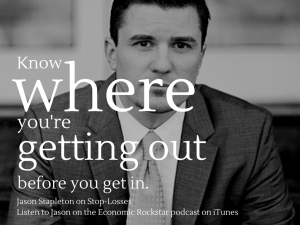
Advice: ‘Don’t Settle. Be Exceptional’
- Jason advises that the key to successful trading is to develop a trading strategy and emphasises the benefits of backtesting – “the real benefit of backtesting is the psychological aspect.” Find out more on the benefits of backtesting in this interview.
- On stop-losses: “Know where you’re getting out before you get in.”
- “Most people in life settle for some level of mediocrity between total failure and their true potential. They just settle in life. I would just simply say don’t settle. I don’t care what it is you do, don’t settle. Be exceptional at what you do.”
Episode 003: Erin Lowry on Millennials, College Debt and Asking for the Order
Personal Habits: ‘A Respect for Money’
A respect for money was instilled in Erin at a young age by her father, which she carried right through into her adult life. As a head-strong decision-maker, Erin was faced with an ‘economic’ choice in adolescence which resulted in her finishing college debt-free! These traits, coupled with her mother’s mantra ‘Ask for the Order’ has given Erin enough social and financial clout too pursue her love of personal finance and helping fellow millennials to straighten out their finances.
Advice: ‘Pay Yourself First’
- If you felt an outcome was unfair, ‘Ask for the Order’. If you don’t tell people what you want, they can’t read your mind and the worse someone can tell you is ‘No’.
- I find that list writing helps me organize my thoughts and then when I cross something off, it’s just such a satisfying feeling.
- If you are having debt problems, talk about it to your loved ones, to your closest friends, to a credible financial planner or to a priest.
- ‘Put yourself out there, develop contacts and network with others. You can be successful this way.’
- ‘Never just make the minimum payment on your credit card. Pay it off in full. Banks will earn high interest on outstanding credit card debt.’
Episode 004: Jadrian Wooten on Using Sports to Carve Out a Career in Economics – Sports Economics
Personal Habits:
- “My goal is try to get people reading about economics or thinking about economics.”– Jadrian Wooten.
- Jadrian has a unique style of teaching that comes from the influences of his past teachers.
- “I am a word minimizer when it comes to slides. I love talking. I have no problem chatting with students and being in front of the classroom.”
- “I am a big believer in showing them data, showing them graphs, showing them stuff that’s actually going on – actual application.”
- “I am a big believer in the ‘Zero Inbox’. I don’t keep e-mails in my inbox. If something comes into my e-mail, I’ll respond to it immediately if I can.”
Advice:
- If you think you have the ability when you start and if you put your mind to it, you can achieve the things that you want to do and if you don’t think that you can do it, then you know that’s also true, you are going to end up failing because of self-defeat.
- The more you read, even books that are non-academic, you can see economic applications.
Episode 005: Hector Avellaneda on Buying Gold to Protect Your Wealth from a Dollar Crisis
Personal Habits:
- A hard worker, head-strong, determined, passionate and a desire to find out the truth through research, self-education, reading and learning.
- Hector had a desire to find out what went wrong in his life as he was mis-sold the American idea of taking on college debt . With a limited exposure to finance and economics in college, $50,000 of college debt and unemployed due to the Great Recession of 2008, Hector read widely to learn and understand about the truth behind the US economy, the trillions of dollars of debt and the risks of a mass student loan default and a dollar crisis.
Advice:
- Before making a college decision, do a course that will allow you to earn an income to pay off your debt, otherwise do not take on college debt.
- To have financial and economic freedom, become an entrepreneur.
-
Increase your understanding of financial literacy. Read books on money.
-
Schools and Universities need to teach more economics, finance and financial literacy subjects to all students.
-
Self-education is very important – read books and get access to the necessary information online.
Episode 006: Andrew Heaton on Using Comedy to Explain Economic Concepts
Personal Habits:
- Andrew works extremely hard to get things done. He has blended comedy with economics to allow this dismal science to become enjoyable or entertaining.
- Andrew believes that having the right mentor is hugely beneficial and such a relationship allows him to learn and focus on reaching small milestones. This has worked out favorably well for Andrew in the field of economics where he developed a strong set of opinions on some theoretical aspects of economics. By expanding his knowledge-base through economics books and the many discussions with his mentor, Gene Epstein, Andrew has opened new doors and created new opportunities that otherwise may not have been attainable. His love of economics, particularly the Austrian and Chicago Schools and libertarianism, has given Andrew a lot of material to work on for his comedic performances onstage, online and in books.
- Andrew writes quite frequently and believes that constant writing will have a payoff in terms of the publication of a book.
- Andrew writes ‘common sense economics for people who need to learn about common sense economics’
- ‘When you start arguing with somebody your adrenaline level shoots up. Just on a biochemical level, you become much less able to hear what they are saying because you are taking a defensive posture. Conversely, when you’re laughing, you produce endorphins. And, if I can make you laugh, for a moment you are willing to listen to me – just for a moment.’
Advice:
- ‘If you’re gonna have a lot of activities that you are doing, you need to be mentally organised and very good at prioritising.’
- ‘To supercharge your day, when you are getting to your tasks, do the one you hate most first… the rest of your day is a cinch.’
- ‘With books, the trick is you just write a thousand words a night… your subconscious mind works on it and when you sit down the following night it’s a little bit easier. You have a full novel in two and half months.’
Episode 007: Ryan Blair – Gangster turned Millionaire on Decision-Making, Game Theory and Incentives
Personal Habits:
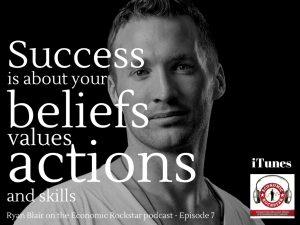 Ryan’s Philosophy: “Success is about your beliefs, values, actions and skills. So if you work on all of these things you will be successful.”
Ryan’s Philosophy: “Success is about your beliefs, values, actions and skills. So if you work on all of these things you will be successful.”
- Ryan’s life purpose goal: “I will measure my influence by the network of the people I can draw upon for inspiration and economic creation.
- On Failing: “I fail forward and try to draw from certain things or from my gang past or maybe perhaps an investment that I made that didn’t work out so well.”
- Asking questions: “I ask a lot of questions of myself. Am I doing the right things? Am I making the right adjustments necessary for me to achieve the result that I want? I ask myself the question ‘Why not?”.
- Decision-making: “If bad decisions are made, you’ve just got to assess it, understand it and make better decisions, and eventually you accumulate enough right decisions to where you’ve got success”.
- “The Path is all Math” – “you’re reverse engineering or you’re finding the mathematical equation to get the result you’re looking for and that could be a result of fixing any deficiency in your life or to improve something. There’s generally a mathematical path to it and that could simply be the number of steps in the formula or the amount of time it takes for you to get the result that you’re looking for.”
- Attributes required to make multi-generational wealth: creativity and strong work ethic.
Advice:
- On Vision: “I use that method in my life and my conscious and subconscious has no choice but to pursue them because I really fall in love with the vision.”
- On Recruitment: “Recruitment is one of the most important things on building a culture in business.
- Be careful in deals that you do as an entrepreneur with venture capitalists or sophisticated investors.
- On Getting the Best Deal: “If you’re not prepared to walk away [from the deal] and the other party knows that, then you’re gonna be out-negotiated in many cases or you simply won’t get the best result possible for you, your family and your shareholders, which is what’s most important in a business negotiation”.
- On Learning: Because Ryan knew that he wanted to be an entrepreneur, it was easy for him to associate learning with growth as an entrepreneur.
- On Opportunities: “Opportunity exists all around you. If you’re looking for it and if you train yourself in how to see it – start there. If I sat in my garden, I could possibly find an opportunity to become an entrepreneur and be successful”.
- On Nutrition and Learning: “Have a breakfast in the morning before school so as to have a proper education. Nutrition is so important to learning and to growth in an individual.”
Episode 008: Robbie Butler on Using Sports to Teach Entry-Level Economics
Personal Habits: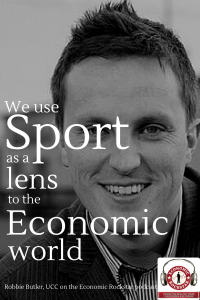
- Robbie, like all great educators, is always learning about the most optimal ways to teaching economics.
- Constantly updating the teaching material.
- On the Value of Informal Meet-ups: “Some of our coffee meetings can be quite vicious, but it’s a good sounding board for ideas.”
- On Ways of Learning: “Because we all learn in very different ways, we need to teach in such a way that tries to capture as many forms of multiple intelligence theory as we can. We use sports as a lens to the economic world”.
Advice:
On Learning and Teaching Economics: “We all have to develop ourselves and our understanding”.
On Research: “Try and keep the material as current as you possibly can”.
On Hard Work: “Hard work is everything. Nobody is born with an innate ability to do something. The harder you work, the easier things become. Thant applies to college, studying, sports and life in general” – Robbie Butler, UCC.
Episode 009: Naomi Brockwell (Bitcoin Girl) on Bitcoins, Liberty, Government and Fiat Currency
Personal Habits: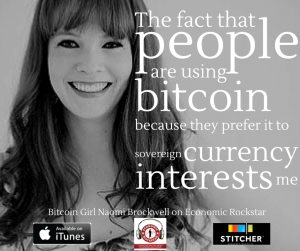
- “I like people who are inspiring and I like reading their biographies” – Naomi Brockwell
- Naomi subscribes to Louise Hay’s Daily Affirmation
- Naomi and Gene Epstein run an Austrian economics reading group together.
- Economics is just an incredible way of helping the less fortunate areas of society, of helping people out of poverty, of helping the unrepresented, people being persecuted by government. Economics, if you really understand it, provides all of these answers. With economics, you could do a lot more to help people.
Advice:
- “We really underestimate what we can achieve and if we remember that so much more is possible than we may think, then that’s a good way to live. It encourages you to press your boundaries and explore new horizons. Seek what your potential is, really try to fulfil your potential.” – Naomi Brockwell
Episode 010: Douglas Goldstein on How Chess Can Teach Us Lessons on Strategic Financial Planning
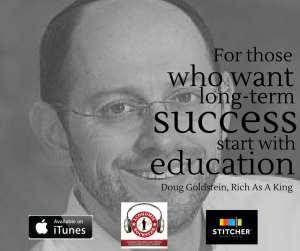 Personal Habits:
Personal Habits:
- ‘I tend to be more conservative. I look for ways of trying to protect my business and my savings. I’mconstantly looking for problems, coming up with solutions before the problems arise so that they don’t arise.’
- Goal-setting. Check out Doug’s and Susan’s goal-setting paradigm STRATegic in Rich As A King.
- Doug is an anti-debt person and is a philanthropist.
- Doug organizes everything first thing in the morning – calender, email and builds a list of what needs to be done. He does the unpleasant but most important things first. Everything that’s crossed out are his accomplishments for the day.
Takeaway:
- Don’t be afraid to pick up the phone and calling someone if you have a question about your business.
- Having a pretty good strategy today is much better than having no strategy until maybe one day you’ll develop one.
- It’s okay to develop as a strategist. It’s what all investors do and it’s what all chess players do.
- The news you’re getting from most sources is probably useless.
- ‘Give me a stock clerk with a goal and I’ll give you a man who will make history. Give me a man with no goals and I’ll give you a stock clerk.’ J.C. Penney
- Doug uses this quote from Alice in Wonderland to explain the concept of having a specific budgeting roadmap or goal set within a certain time frame.
- When Planning for a year, plant corn. When planning for a decade, plant trees. When planning for a life, train and educate people’ – Chinese proverb.
Advice:
- There’s nothing that you’re actually going to know about what’s going to happen tomorrow in the markets. But what you do know is to educate your clients about how to responsibly take care of their own money.
- Amateur investors and amateur chess players move around because they can’t figure out their strategy. They make a move that doesn’t really have a purpose and that’s a huge mistake.
- Go into meetings and discussions with people as a friend. Assume that they’re there to work with you and not against you. You’ll be much happier.
- Focus on developing a strategy.
- Build your community – that’s how you will ultimately succeed. Build a group of people that you can constantly be in touch.
- ‘Spend a lot more time focusing on what you can give to people, than what you can get from them. I believe that’s the path to success.’ Doug Goldstein
Career Advice
‘We are not the same as our parents and grandparents. You’re not going to work for some company for your whole life and then retire with a great pension at 60. it’s up to you to take care of yourself. The governments going broke, your parents are probably going broke, you’re going broke and you’re in debt. You’ve got to get your own act together. As soon as you understand how business works, you should try and set your own sails and find something that you really enjoy doing, that can add value and work really hard to do it.’
‘There’s nothing wrong with a little bit of hard work in order to succeed. Don’t assume someones going give it to you’
Episode 011: Steve Keen on Debunking Economics and the Misinterpretation of Keynes
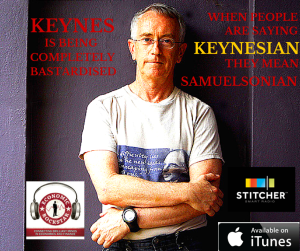
012: Yoram Bauman on Cartoons, Being a Stand-Up Economist & His Passion to Save the Environment
.
Podcast: Play in new window | Download
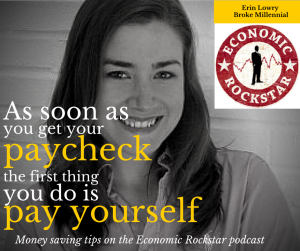

 065: Best of 2015 Part 1: A Look Back at the Economic Rockstar Podcast
065: Best of 2015 Part 1: A Look Back at the Economic Rockstar Podcast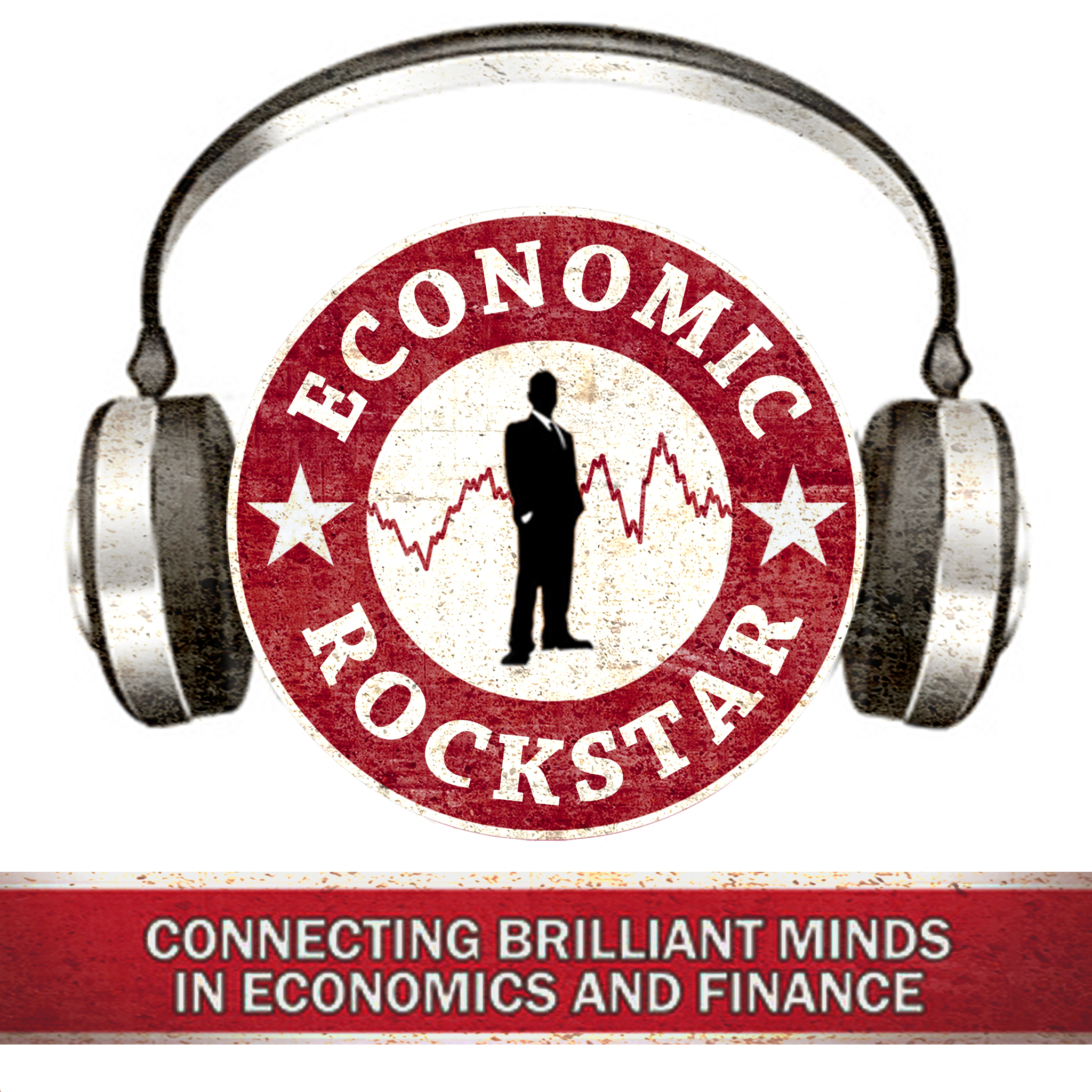 066: Best of 2015 Part 2: A Look Back at the Economic Rockstar Podcast
066: Best of 2015 Part 2: A Look Back at the Economic Rockstar Podcast 007: Ryan Blair – Gangster turned Millionaire on Decision-Making, Game Theory and Incentives
007: Ryan Blair – Gangster turned Millionaire on Decision-Making, Game Theory and Incentives 000: About Economic Rockstar
000: About Economic Rockstar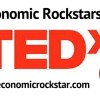 Economic Rockstar Guests on TED
Economic Rockstar Guests on TED 038: Leah Bell on Being an Angry Grad and Setting Yourself Up for a Life of Success
038: Leah Bell on Being an Angry Grad and Setting Yourself Up for a Life of Success 040: Rebecca Harding on Trade Finance and How Delta Economics Can Help Identify Growth Opportunities World-wide
040: Rebecca Harding on Trade Finance and How Delta Economics Can Help Identify Growth Opportunities World-wide 047: Victor Ricciardi on The Psychology of Financial Planning and Investing
047: Victor Ricciardi on The Psychology of Financial Planning and Investing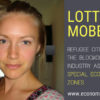 155: Lotta Moberg on Refugee Cities and the Blockchain Industry as Special Economic Zones
155: Lotta Moberg on Refugee Cities and the Blockchain Industry as Special Economic Zones 025: Dan Hamermesh on the Economics of Beauty: Attractive People Are More Successful
025: Dan Hamermesh on the Economics of Beauty: Attractive People Are More Successful